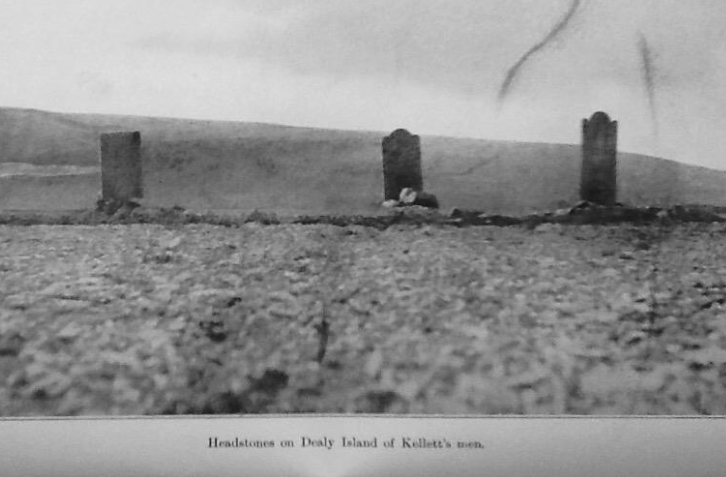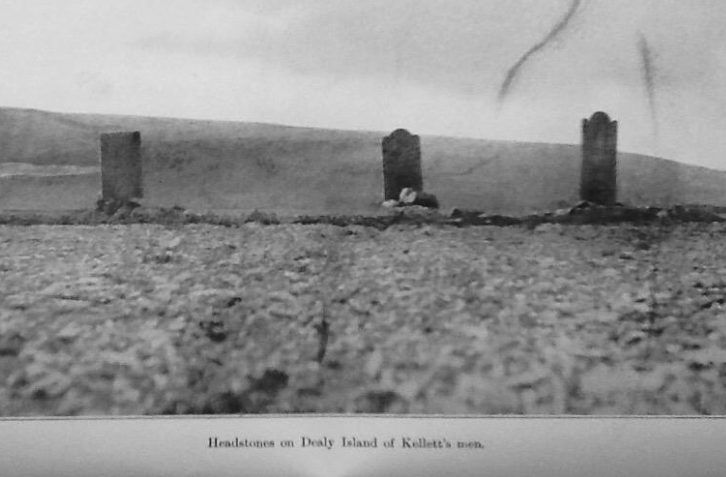
Quite a while ago my friend, Martin Kellett, asked me about the graves in this image “Headstones on Dealy Island of Kellett’s Men”. In total 5 men from Resolute and Intrepid died during the Belcher Expedition. Three of them died while Kellett’s 1852-1853 winter camp was still in place off Dealy Island before Resolute & Intrepid headed back east during the autumn of 1853. The remaining two men died in 1854.
The men are listed in date order of their deaths:
Thomas Mobley died on 19 October 1852. From the small village of Buckland, in Buckinghamshire, Thomas was a 39 year old Private in the Royal Marines, and had first enlisted in the Royal Navy on 12 April 1834. He mustered in to served onboard Resolute on the 21st of February 1852. (All the rest of the men who died were serving on Intrepid.) He died near the close of the autumn sledging trips, while everyone anxiously awaited the return of the final team led by McClintock. Having a weak heart, Dr. Domville had hoped to preserve Thomas’ health by keeping him on light duties. When, on 18 October, Mobley tried going outside without wearing proper clothing, the shock of the cold air made him turn back. Upon reaching the deck his heart stopped and he immediately collapsed. He had been well liked by his shipmates and the Intrepids, and his sudden death badly affected everyone. The sadness permeated Resolute, and McDougall wrote:
“Few things in my somewhat eventful life, have produced a more saddening effect than that occasioned by the death of this man-who was beloved and respected by all onboard…the respect of the officers and men toward him was sincere. He was beloved by his shipmates for his amiable qualities, and respected by the officers for his trustworthy character…an upright man, and I believe a sincere Christian, he died as he had lived- ‘the noblest work of God’ -an honest man.”
The Royal Marines were formed into divisions. The first 3 divisions were based in Chatham, Portsmouth and Plymouth. The 4th division was established at Woolwich from 1805 – 1869. Each division consisted of several infantry companies, and these were numbered. Mobley mustered from the Woolwich Division, and his infantry company number was 92.
George Drover, died on 12 December 1852. George was Intrepid’s fo’c’le captain. Variously recorded as being 27 and 33 years old, he was from Alverstone, Hampshire, on the Isle of White, and had served on HMS Assistance during the 1850-1851 Austin Expedition. He was a Woolwich volunteer who mustered in onboard Resolute on 24 February 1852. Dr. Domville recorded pleuritis as the cause of his death. (The same as pleurisy, it is the painful inflammation of the tissues that separate the lungs from the chest wall.) George had crossed Melville Island between 14 September and 2 October 1852. He then set out again on HM Sledge Hero on 7 October, but he had to return that same day because he was feeling unwell, and he remained on the sick list util his death. His funeral service was on 19 December and McClintock had him buried next to Thomas Mobley.
John Coombes, who died on 12 May 1853, was born in St. Stevens, Cornwall. He mustered in onboard Resolute on 24 February 1852 to serve as a stoker onboard Intrepid. At the time he had been serving on Victoria & Albert and was 32 years and 9 months old. Resolute’s Muster Book reveals he was 5 feet, 9 inches tall, had a fair complexion, grey eyes and brown hair, and was married. John had spent his entire working life in the Royal Navy. Before the Belcher Expedition he had served on:
HMS Gordon (1839-1842)
HMS Styx (1842-1844)
HMS Stromboli (1844-1847)
HMS Victoria & Albert (1848-1852)
Coombes died while sledging under the command of Francis Leopold McClintock. They were returning to the ships, and McClintock’s men had joined De Bray’s team on the way. After an autopsy, Dr. Domville recorded his death as being caused by hypertrophy of the heart and pulmonary apoplexy.
From the American Mayo Clinic’s website,
“Hypertrophic cardiomyopathy (HCM) is a disease in which the heart muscle becomes abnormally thick (hypertrophied). The thickened heart muscle can make it harder for the heart to pump blood. Hypertrophic cardiomyopathy often goes undiagnosed because many people with the disease have few, if any, symptoms and can lead normal lives with no significant problems. However, in a small number of people with HCM, the thickened heart muscle can cause shortness of breath, chest pain or problems in the heart’s electrical system, resulting in life-threatening abnormal heart rhythms (arrhythmias) or sudden death.”
Below are the two remaining “Kellett Men” who died during the Belcher Expedition.
Thomas Hood died on 2 January 1854. He was a Private in the Royal Marines, and first enlisted in the Royal Navy on 16 June 1841. Born in Brewood, Staffordshire, a small village (just NW of Birmingham, Staffordshire), he was 30 years old when he mustered in on 21 February 1852 for service on Intrepid. He was among the Royal Marine Woolwich volunteers, and his infantry company number was 60.This is what I wrote about him in my new manuscript:
Only two days into the new year Intrepid’s Royal Marine Thomas Hood died. He was one of the experienced Arctics, and McClintock knew him well because they’d traveled together in 1851 on a ninety day sledge journey during the Austin Expedition. He’d been ill for a long time with a chest complaint and died after suffering a heart attack. While his shipmates had expected his death, it was still seen as an ill omen for the new year to begin with his funeral. In his will he left five pounds and all his clothes to his friend, Jeremiah Shaw, who had nursed him through his illness. He left everything else to his sister.
The final Kellett man to die was Intrepid’s ice quartermaster James Wilkie on 2 February 1854, exactly one month to the day after Hood. 37 years old when he mustered in, his nickname was “Stoneman” and he was born in Dartmouth, Devon, was only 36 years old, and left a wife and three children. Stoneman Wilkie was also an experienced Arctic, having served with Hood twice, during the 1848-1849 Ross Expedition, and in the 1850 – 1851 Austin Expedition.
McDougall wrote about them in his journal, noting both were respected for their strength and endurance: “Poor Wilkie, ice quartermaster of the ‘Intrepid’, breathed his last at 3AM, of disease of the heart and effusion of the chest. He had been on the sick list nearly the whole winter, but was not considered in danger until within about three weeks of his death…It is a sad reflection that Intrepid should have lost no less than four out of her crew of thirty souls, being nearly one-seventh of the whole…The following day, the 3rd, all that remained of poor Wilkie was consigned to the grave, just as the first beams of the long absent sun tinged the southern horizon.”
From my ms I wrote:
What a difficult juxtaposition of feelings the men must have felt, those of loss and sadness, against that of relief. Even the well-attended lecture series couldn’t lift the cloud of gloom these deaths left behind.
